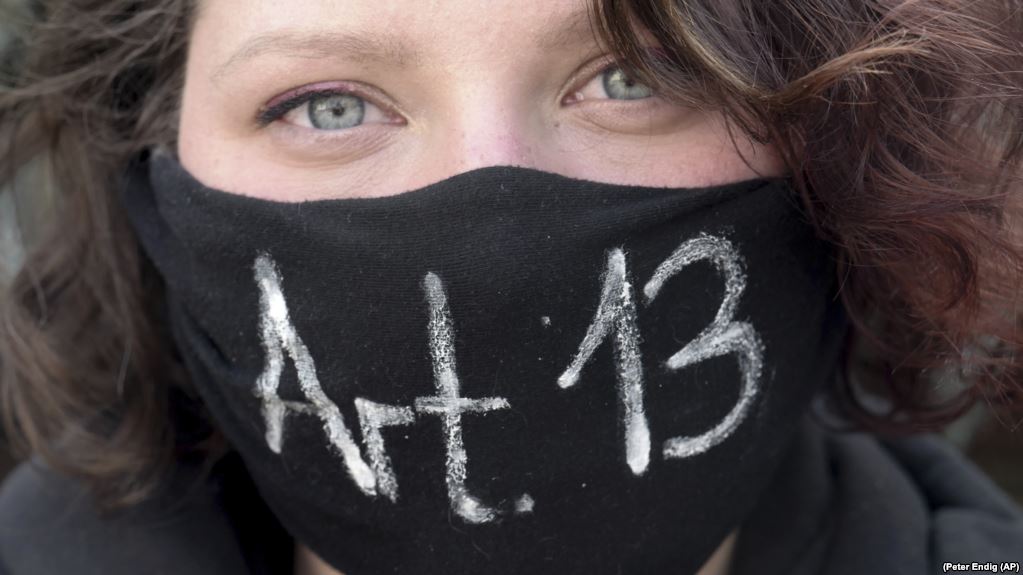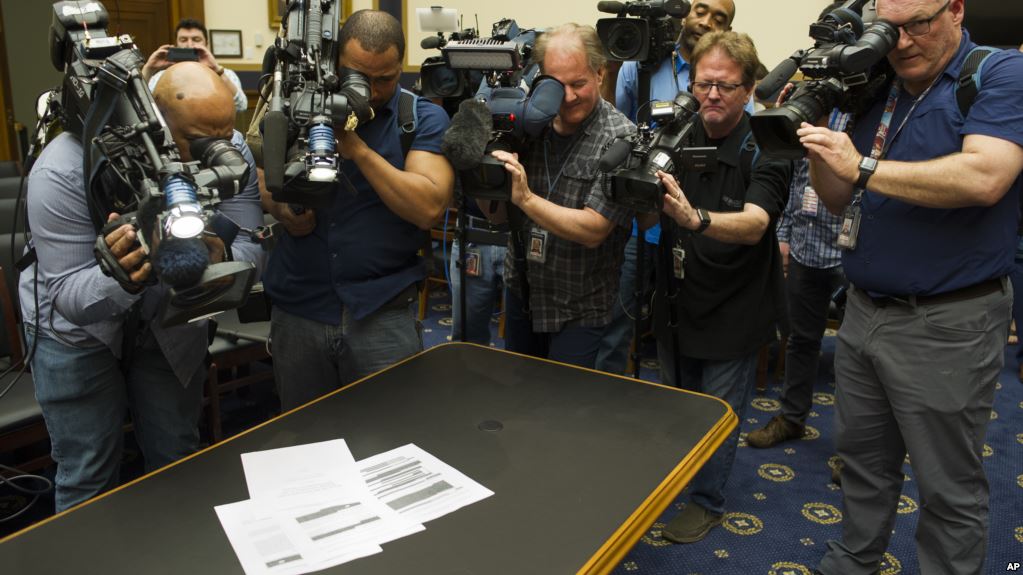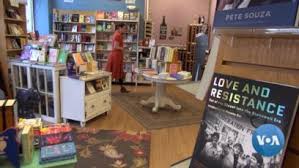뉴스&스피킹(영자신문)
하루 10분이면 영어에 대한 두려움을 극복하고 누구나 유창하게 영어를 구사하실 수 있습니다.
-
 Notre Dame Fire Seen Live Worldwide Tests Social Media France has promised a worldwide effort to rebuild Notre-Dame Cathedral in Paris, the famous Christian church damaged by fire this week.
Notre Dame Fire Seen Live Worldwide Tests Social Media France has promised a worldwide effort to rebuild Notre-Dame Cathedral in Paris, the famous Christian church damaged by fire this week.
Many people have been sharing pictures of themselves and their families visiting Notre-Dame. For many, the building combines their personal memories with a long-established cultural heritage.
Live images of the fire were broadcast and shared as firefighters struggled to contain the flames that destroyed the building’s tall spire and its wooden roof.
The fire happened at a time when some social media companies are testing methods for fighting back against false information. But in the case of YouTube, its methods did not help stop false information from spreading. YouTube’s algorithm detected the images of the burning cathedral and sent users links about the terrorist attacks on the World Trade Center on September 11, 2001. Links included Wikipedia and Encyclopedia Britannica entries about the 9/11 attack.
Observers say the incident demonstrates some of the problems with automatic systems that are meant to correct misleading information.
Worldwide calls to rebuild
French president Emmanuel Macron sent a message on Twitter expressing sadness at the loss, “I am sad tonight to see this part of us burn.”
He and many French leaders stressed the importance of the cathedral to France’s common culture.
U.S. President Donald Trump tweeted that he offered sympathy to the head of the Catholic Church Pope Francis and offered U.S. experts to help rebuild it.
Notre-Dame de Paris is among the most famous Catholic churches in the world and is the seat of Catholic leadership of Paris. It is estimated that 13 million people visit the building every year.
The Paris public prosecutor is investigating the cause of the fire, which is suspected to be linked to extensive renovation work.
On Wednesday, France announced it would invite architects from around the world to propose designs to replace the spire that was destroyed in the fire. Prime Minister Edouard Philippe said a competition would decide whether the cathedral should have a new design or be rebuilt as it was.
I’m Mario Ritter Jr.View -
 How Old Are You? In Korea, Answers May Differ Lee Dong Kil’s daughter was born on December 31, 2018.
How Old Are You? In Korea, Answers May Differ Lee Dong Kil’s daughter was born on December 31, 2018.
She arrived late in the night – two hours before the start of the New Year. But two hours later, the baby girl became 2 years old.
She was not alone in aging quickly. Every baby born in South Korea last year turned 2 on January 1st, 2019.
Based on an unusual system for calculating ages, South Korea’s babies become 1 on the day of their birth. They become an additional year older on January 1st.
Lee Dong Kil remembers sharing news about his daughter’s birth on social media. His friends immediately sent him messages to congratulate him.
"An hour later, when the New Year began, they phoned me again to say congratulations for my baby becoming 2-years-old," said Lee. "I thought, 'Ah, right. She's now 2 years old, though it's been only two hours since she was born. What the heck!'"
By the way, Lee is 32 years old internationally, but 34 in South Korea.
Exactly how this aging system developed is not clear. Defining a full-term pregnancy as one lasting 40 weeks is one way to explain why babies are one when they are born.
But becoming a year older on January 1st? That is even harder to explain.
Jung Yon-hak is with the National Folk Museum of Korea in Seoul. He suggests that perhaps ancient Koreans cared about the year in which they were born in the Chinese 60-year cycle. Without modern methods of measuring time, they did not care much about the specific day they were born.
Officially, South Korea has used Western-style calculations since the early 1960s. But many South Koreans still use the old system in their daily lives. The government has done little to get people to change over to the Western system.
In January, lawmaker Hwang Ju-hong proposed a bill that would require the government to put international ages in official documents. The bill also urges citizens to go with their international ages in everyday life. It is the first legislative attempt to end "Korean age."
The goal of the bill is to end confusion “caused by the mixed use of age-counting systems," Hwang said in the proposed legislation.
His office said a parliamentary committee discussion and a public hearing on the issue are expected in coming months.
Opinion studies in recent years showed more South Koreans supported international age. It was not clear, however, how seriously they wanted a change.
"If we use international age, things could get more complicated because it's a society that cares so much about which year you were born," said Lim Kyoung Jae, head of the Seoul-based Miko Travel agency. "We should also definitely count the time of a baby being conceived and growing in its mother's womb."
Lim's employee Choi Min Kyung, who is 26 internationally and 28 in South Korea, disagreed.
"It's good to be two years younger ... (especially) when you meet men" on blind dates, Choi said with a laugh. "There is a big difference between 26 and 28."
I'm John Russell.View -
 New European Law Will Change the Internet On Monday, the European Council of the European Union, or EU, approved new copyright rules. They aim to give more protection to artists and news organizations. Critics say the new rules will limit freedom of speech and online creativity and punish smaller web companies.
New European Law Will Change the Internet On Monday, the European Council of the European Union, or EU, approved new copyright rules. They aim to give more protection to artists and news organizations. Critics say the new rules will limit freedom of speech and online creativity and punish smaller web companies.
Famous artists, performers and tech experts have spoken out both against and in support of the EU directive. The 28 EU members are required to establish the law in their countries. The law will have an influence on everyone, however, as the internet crosses many international borders.
Permission required
There has been much debate on one part of the directive that affects internet platforms such as Facebook, YouTube and Twitter. The directive asks online platforms to require their users to get permission to upload any material from the creator of such materials. It says the platforms will be responsible for making sure that their users obey the law. Some think that meeting these rules will reduce freedom of expression on the internet and could result in censorship.
Another part of the law requires search engines (like Yahoo! or Google News) and social media sites to pay for linking to or showing a few sentences from news articles. Paying for each of those links will increase costs for the companies.
Effect on internet platforms
Some sites would be forced to get a written agreement to use music or videos. If not, sites would have to make sure they do not include unlawful copyrighted material. Computers will have to look for such material and remove it, since it would be impossible for humans to check the large number of uploads to the internet.
That could give large tech companies a major advantage over smaller companies. Google said last year it spent more than $100 million on a system for approving material on YouTube. More than 400 hours of content is uploaded every minute.
Will it change internet culture?
Critics say the EU directive could act as censorship and change internet culture. That is because the automatic filters may delete some material that should be permitted online. YouTube said that to avoid trouble in some cases, it would have to block videos if they are unsure about the copyright.
Some users worry that the new rules would stop creation of parodies and viral internet “memes” so popular in online culture. Such content is often based on or connected to existing songs or movies or other content. The EU directive permits this kind of use as an exception to its rules.
Julia Reda is a lawmaker with the Pirate Party, which campaigns for freedom of information online. “The new law makes everyone a loser … Artistic diversity has made the Internet colorful, but unfortunately the copyright directive will make the Internet duller,” she says.
Will it help writers and artists?
Some artists think the directive will help them. The music industry and other groups that collect fees say the change will help. It will require big tech companies such as Apple, Facebook and Google to pay artists, writers and creators more for their work. Google estimates it has paid out more than $3 billion to rights holders through its Content ID system, which was created in 2007.
Some high-profile artists have supported the change. Former Beatles member Paul McCartney wrote an open letter to EU lawmakers asking them to approve the new rules.
Others are afraid they will not earn much more money and that their creativity will be silenced.
But many worry it will change the internet as we know it. More than 5.2 million people signed an online appeal to stop the new rules. Internet stars such as Tim Berners-Lee, the inventor of the World Wide Web, and Wikipedia co-founder Jimmy Wales are against it. So is Wyclef Jean, the former leader of the music group the Fugees. He has said he is better off financially because fans can freely share his music on internet platforms.
German government spokesman Steffen Seibert says Germany wants to avoid upload filters and hopes “that user rights — freedom of opinion, about which there has been a lot of discussion here — be preserved.”
Last month, tens of thousands of people marched in cities across Germany to protest the directive. Poland’s leader has said his country will not enforce it, arguing it threatens freedom of speech.
Next steps
The EU’s member countries have two years to follow the directive by changing their own national laws. Six countries — Italy, Sweden, Poland, Finland, the Netherlands and Luxembourg — voted against it, so enforcement is likely to be uneven. There will probably be many arguments in court before the laws have all been changed.
I’m Jill Robbins.View -
 Mueller Details Trump's Attempts to Interfere with Investigation The United States Attorney General William Barr released most of a special government report on Russian interference in the 2016 presidential election Thursday.
Mueller Details Trump's Attempts to Interfere with Investigation The United States Attorney General William Barr released most of a special government report on Russian interference in the 2016 presidential election Thursday.
The report from Special Counsel Robert Mueller said that “while this report does not conclude that the President committed a crime, it also does not exonerate him” on the issue of obstruction of justice.
The report also found there were many contacts between the Trump campaign and Russia. But, it said, “…the evidence was not sufficient to support criminal charges.”
During the Thursday morning event with wounded military veterans, President Donald Trump said, “I’m having a good day.” He declared, “It’s called no collusion, no obstruction.”
The Mueller report said the president’s efforts to influence the investigation were mostly unsuccessful, “largely because the persons who surrounded the President declined to carry out orders or accede to his requests.”
Barr read a statement and answered questions from reporters shortly before he ordered the release of the 448-page, redacted report Thursday. He said the “redactions” are needed to protect grand jury information, intelligence secrets, ongoing investigations and the privacy rights of others. The attorney general added that a report with fewer redactions will be made available to a small group of Congressional leaders.
Democratic Congressman Jerry Nadler of New York is the chairman of the House Judiciary Committee. He called Barr’s decision to withhold the full report “regrettable.”
Nadler said in a statement, “The report concluded there was ‘substantial evidence’ that President Trump attempted to prevent an investigation into his campaign and his own conduct.” He then asked for Mueller to testify before Congress by May 23.
Robert Mueller was named special counsel on May 17, 2017 to investigate “Russian government efforts to influence the 2016 election and related matters.” The appointment came after Trump had dismissed Federal Bureau of Investigation Director James Comey and told Russian officials that the pressure had been “taken off.”
Obstruction of justice
The report said that, when Trump learned of the appointment, he said, “This is the end of my Presidency.”
The report examined 11 actions by the president related to the obstruction of justice investigation.
Trump was said to be concern that the Russian interference investigation might lead the public to question the legitimacy of his election.
It said the president directed White House lawyer Don McGahn to dismiss Mueller but he refused. The president then pressured McGahn to deny news reports about it.
News reports of a meeting at Trump Tower in New York City on June 2016 became known in the summer of 2017. The report said that, when the report became known, Trump directed his staff to say the meeting was about adoptions of Russian children. The meeting, attended by his son and top campaign officials, was to receive damaging information about the presidential campaign of Hillary Clinton.
Trump declined to answer questions from the special counsel in person. Instead, he provided written answers in November 2018. The report said, “…the President stated on more than 30 occasions that he ‘does not recall’ or ‘remember’ or have an ‘independent recollection’ of information called for by the questions.”
Trump denied any knowledge of the Trump Tower meeting before it took place. He said his claim that he hoped Russia would find missing Clinton emails was not serious.
The president’s lawyers have also claimed that the president is not subject to obstruction of justice laws because of his constitutional position as head of the Executive branch.
Mueller, however, said in the report that “Congress has authority to prohibit a President’s corrupt use of his authority in order to protect the integrity of the administration of justice.”
Attorney General Barr has already agreed to appear before Congressional committees to talk about the report.
I’m Jonathan Evans.View -
 Independent Bookstores Growing in the US Small, independent bookstores in neighborhoods across the United States are places to discover new books and make friends.
Independent Bookstores Growing in the US Small, independent bookstores in neighborhoods across the United States are places to discover new books and make friends.
About 20 years ago, stores like these were closing in large numbers because of competition from large bookstores and online book sales.
But about 10 years ago something unusual happened: independent bookstores seemingly came back to life. Many are profitable, and the number of stores is growing.
In a Virginia community called Arlington, many people buy their books at a store called One More Page Books. Customer Cheryl Moore says she likes the personal service she receives at small bookstores.
Moore told VOA: "I think they pay attention to the kinds of books people like to read. They have book clubs, so I don't think it's a place where people just buy books, but make friends here.”
In another part of the store, Kate Oberdorfer looks through an unusual mix of books: mysteries, cookbooks, and biographies of famous people.
Oberdorfer talks about a few of the books with Lelia Nebeker.
"I do think it's a special place for people to come,” said Nebeker.
She lives nearby and buys books for the store, which opened eight years ago.
After almost dying off, small, independent bookstores grew by 35 percent between 2009 and 2015. The American Booksellers Association says sales at the more than 2,400 bookstores across the country rose about 5 percent over the past year.
Hooray for Books is an independent store specializing in children's books. It opened 11 years ago in Alexandria, Virginia. Owner Ellen Klein thinks part of her store’s success has been providing many different kinds of books.
"In this community, we have a lot of mixed race families,” she said, “and so we're trying to serve them as well.”
Customer Sarah Reidl looks at all the children’s books and said, "You just can't really browse on the internet. I like to be able to browse and look for things…that catch my eye."
For people who love reading, independent bookstores sometimes become a home.
Kristen Maier lives in Missouri, but often comes to Hooray for Books when she visits the Washington, DC area for work. She does not think electronic devices can replace the feeling of holding a real book.
“If you don’t have a nice book to pass down to your grandkids or their grandkids, you just kind of lose that sense of history and tradition for your family,” she said.
Independent bookstores know they have to sell more than books. One More Page tries to appeal to people by offering them wine or chocolate they can take home along with a book.
"We are a place where you can come for events, you can meet writers, get books signed, and buy books you might not necessarily (find) on your own,” said Nebeker.
Including books by Ed Aymar, a local writer. He is talking to customers about his latest book, The Unrepentant. Nearby a woman is performing songs related to the story.
Angie Kim, another local writer, came to support Aymar.
“I’ve been here for 5 events just in the last couple of months,” she said. “I think it’s just a …way to show the bookstore that we care about spaces like this and that we want them to continue.”
“We’re going to keep doing what we do well, and hope that our community loves having us around enough to support us,” Nebeker added.
I’m Susan Shand.View

